Original Time of Writing: December 20th, 2020, updated December 27th, 2020.
All articles are subject to editing after the original posting.
Missing Person: Paula Jean Welden
Last seen or contact date: December 1st, 1946
- At about 245pm Lou Knapp, a man who picked her up, claimed he dropped her off near Route 9 and she headed in the direction of the Long Trail.
- About an hour later there's a report that someone named Ernie Whitman met her in an area called Woodford Hollow and directed her toward the Long Trail still.
- Other residents of Woodford Hollow claimed they saw her at a place called Fay Fuller camp, a shelter on the Long Trail.
- An eighty-year-old named Walter Mould claimed he saw her thumbing a ride but there's an indication that she was seen after this by those on the Long Trail (see clipping below picture).
The case of Paula Jean Welden has a similarity to an old story that we have all heard: Little Red Riding Hood. Welden, an 18-year old college student, went into the forest on December 1st, 1946 wearing a red parka. She met an unclear fate and what resulted has been a vexing missing person's case for decades. However, I think the balance of the reasonable conjecture would support the opinion that she simply got lost in the forest, perished there, and remains there to be found.
She left the Bennington College campus on the afternoon of December 1st, 1946, which was a Sunday. She told her roommate, Elizabeth Johnson, that she was going for a hike and several other hikers claimed that they did see her on the Long Trail. She has not been seen since.
Where last seen: Long Trail near Glastenbury Mountain in Vermont.
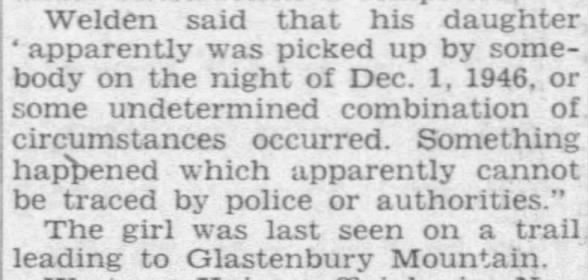
Age at time of disappearance: 18 years old
Hair: Strawberry blonde ("worn in a long bob"/The Journal, Page 7, Jan 17 1947)
Eye color: Blue
Height and weight at the time of her disappearance: 5'5" and 122 pounds
Other: "a slightly turned up nose and a cleft in her chin" and an athletic body (The Journal, Page 7, Jan 17 1947)
Scars: left knee, left eyebrow, vaccination mark on right thigh
What Happened to Paula Jean Welden - Theories
Did Welden meet up with the Big Bad Wolf? That question could be taken almost literally.
Whenever someone goes missing on a forest excursion, there is a chance that it's because of a deathly encounter with wildlife. If you take the question metaphorically, then perhaps the Big Bad Wolf is an unknown rapist, murderer, and/or abductor.
Besides an animal encounter or an abduction, there's the chance of an accident. One could slip down a cliff while hiking or one could fall in a crevice. That depends on how adventurous you get. But, perhaps the Big Bad Wolf, in this case, is just the cold December night.
Hypothesis: Paula Jean Welden Died of Hypothermia
Some people get lost on hikes and succumb to the elements. There's probably a much greater-than-average chance that this happened to Welden.
I have a hiking website as my other blogging passion, and I live in a location of similar northern latitude to Vermont. Take it from me, if it's 4pm in December and you haven't found your trailhead yet, then it's just time to turn around. The night falls fast in December for those that live well north of the equator and it doesn't yield to the sunlight for some 14 hours. That's important to note in this case.
Paula Jean Welden Was LOST From the Start: The Long Trail Mystery of 1946
According to some newspaper reports, Paula Jean Welden had not located the trail that she wanted to hike as of 4pm. That's when a man named Ernie Whitman gave her directions to the trail.
Think about that: as of 4pm, at a time of year when it's dark by 5pm and pitch black by about 530pm, she's still looking for the trail she wants to hike. That's nothing less than a mistake resulting from hiking inexperience. People who hike at night go in groups, with lots of supplies and clothing, and they sometimes have helmet lights.
I didn't find the sunset time for December 1st, 1946, in newspapers from the area. However, I found the next best thing: the sunset time for December 2nd of that year. It would probably only change by minutes or even seconds from one day to the next.
On December 2nd, the sunset time was 413pm at a time of year when it gets a little darker day-by-day. On December 1st, I bet the sunset time was about the same time and that forces an insightful premise: about 13 minutes before sunset she was still getting directions to the trail.
Mon, Dec 2, 1946 – 1 · The Bennington Evening Banner (Bennington, Vermont) · Newspapers.comThis 18-year old, who by some other reports was not dressed warm, was also lacking in experience when it came to trail-hiking. People that hike trails in the evening have warm clothes, they have flashlights if not helmets with lights on them, and they know where the trailhead is. I've left long trails at dusk and questioned experienced hikers still going up on these matters.
Read the snipping of an article below. I think there's your clue as to what might have happened with this girl.
Wed, Dec 4, 1946 – 1 · The Bennington Evening Banner (Bennington, Vermont) · Newspapers.comIf you are still getting directions to a trail at "about 4:00 o'clock" in December, it's just time to turn around and go home as the darkness of a winter evening should be anticipated. Given the time of year and the northern location, if she was hellbent on visiting the Long Trail at 4pm, then it's possible that she would still have been in a forested setting well after darkness set. She was poorly dressed for the conditions, she could have got lost, and she might have frozen to death in some strange spot.
Do you think that a girl smart enough to be in college wouldn't get lost? I would suggest thinking again and I will use my own hiking experience -- which I submit is much superior to that of Welden's -- to make my point. I have been lost in the forest for short periods.
Hiking trails can curve ever-so-slightly so that you are at first heading in one direction but, over time, you end up going in another. It's very possible to think that you are heading north or south or east or west only to have a slight-degree change hold up for a certain length of time, a change that gradually causes you to be heading in a direction that you didn't think you were going.
Of course, place markers help keep you oriented. When I have been lost, it has always been in the light of day. Paula Jean Welden was going into the forest as night-time loomed. Furthermore, when it comes to getting lost in the forest, one factor is that out-and-back trails (as opposed to trails that make a loop route) aren't always as straightforward as you might think.
When you take a trail out and then double back, things can look a little different in reverse. If you don't make a point to memorize forks, then you might head the wrong way on your return.
That's especially a risk if you head one way at dusk and don't recognize the forks in the trails after twilight. All trails that I've hiked in the forest have had diversions, even ones that are not on the trail maps.
The elephant in the room with Paula Jean Welden is that she did not know where she was to begin with. I think this is the point that has been missed in all other publications that cover this missing person.
Her reliance on other people to simply find the trail in the first place is clear. That speaks to a complete lack of familiarity with the area and I repeat -- she's heading into this unfamiliar area as wintertime evening darkness looms.
Paula Jean Welden's Hiking Tips Wouldn't Make it in a Safety Guide
Nothing about her hiking plan would be included in a safe-hiking guide. She's going out alone to somewhere she isn't familiar with as a snowstorm looms (see below) without proper clothing as evening sets in. I challenge anyone to make a stronger case against the opinion that she simply went missing in the forest. Such a person, I submit, would only be the non-hiking type because any experienced hiker will tell you that what Paul Jean Welden was doing was dangerous.
Paula Jean Welden Tue, Dec 3, 1946 – 1 · The Berkshire Eagle (Pittsfield, Massachusetts) · Newspapers.comSo where did Paula go? If she remains in the forest why wasn't she found? Forests are notorious for gobbling up evidence.
On that matter, I could digress, however, I won't. I'll simply state that many times when a person goes missing and a search ensues the person still gets found not far from where they went missing at some time well after the original search. Phrases like "the area was scoured" and "no rock was left unturned" don't mean what they say. Searches fail -- plain and simple.
The scene I'm depicting is exactly what can be taken out of the journalism from the time. The witnesses who saw her last say she was still heading toward the trail to Glastenbury Mountain as night-time fell. Night-time doesn't fall instantly -- there's a period where the shadows start to creep in that can be deceiving. I see the half-light of dusk as a period where Paula kept hiking. A return might be different.
If she gets too deep into the trail and gets lost in the darkness of night, then anything can happen to her. As she loses her vision from darkness, so does she lose her ability to spot place markers, like high points in the horizon.
If she goes in the wrong direction at any time, how long might she stay going in that direction with nothing visible to help her chart a correct course home?
She was 18 years old and described as athletic. As a 43-year-old male, I can still hike in the forest for 6-8 hours. An 18-year-old female with do-or-die adrenaline could walk at least that long if not much longer.
But if she's walking the whole time in the wrong direction, then what happens? At some point, she has to realize that she has gone the wrong way and that she needs to survive the elements of the freezing mountain night.
That means finding a place where the wind doesn't stab, getting into a fetal position, and hoping she lives until help arrives. If she doesn't have water, matters get worse because she'll need to eat snow as a substitute source. That's not going to help her body temperature at all and the balance of everything starts to point to death.
No foul play is required to create this death. She's like a pilot that crashed a perfectly good plane.
Reason vs Rumor in the Forest
I once shared a ride with a woman who spent many nights in the forest. We met using a ridesharing app and she spoke about how she never paid for accommodation while traveling. She claimed that as evening set in she just went into the forest, pitched a tent, and went to sleep. When I asked about concerns over someone coming across her, she made a memorable response.
"You have to understand that once you get 20 yards off of a trail or highway, you are somewhere that no one ever goes."
If Paula Jean got lost she could might have trudged miles and miles into the forest, in an unknown direction, before she realized that she had to surrender for the night. She could have located a wind-free spot 10 to 30 yards off of any trail in a large area in the vicinity of Glastenbury Mountain. That is where I think she will still be found and it's only that the original search area didn't realize just how much territory they had to cover.
An 18-year-old girl on adrenaline that the partly imaginary horrors of the forest at night would create could have walked a very long way before she realized that she had to sleep in the forest. If she gets hypothermia, then she's on her way to death. Then she's buried under the snow that's coming. Then, wearing a red jacket doesn't matter anymore as it doesn't stand out as visible while underneath the snow.
It didn't help at all that the frivolous journalists of the time were selling newspapers claiming that she ran off to Canada and that the run-about police followed those leads. It didn't help at all that every blue-eyed blonde that was spotted in public that was close to the age of 18 was being treated as a Paula Jean Welden sighting. She went missing on her own but make no mistake: she stayed missing in a society where media sensationalism rules and often in place of reasonable conjecture.
I think the sightings of this young woman that were reported that were not on the Long Trail were all entirely fluff. Furthermore, I think the sensationalists that designated the area to be like the Bermuda Triangle did much more harm than good. If everyone that looked for her attested to logic-based conjecture instead of "Bennington Triangle" crap, then only one of two scenarios seems plausible: lost in the forest and one other.
There is, after all, still the Big Bad Wolf to think about in the form of the man that preys on women. In my opinion, that Welden was a beautiful college student that was hiking alone and not afraid to hitch a ride does point toward abduction. That she has not been found in the area, even the greater area, that she was last seen in for what is, at the time of writing, 74 years since her disappearance does weaken the plausibility of the guess that she suffered a hiking mishap that comes when one faces nature.
Welden disappeared but her missing person's case is not one that simply disappeared in the media as many missing-person cases do. Her name was mentioned as recently as June 5th, 2020 in the Los Angeles Times (Page E2). A modern writer drew inspiration from the case.
But the journalism from close to the time of the disappearance is less from the inspired and more from the baffled. In one article, a taxi driver in Quebec claimed he saw her during the week of December 3rd to December 10th.
Paula Jean Welden Wed, Jan 22, 1947 – 1 · St. Albans Daily Messenger (St. Albans, Vermont) · Newspapers.comAnother taxi driver that was local to the disappearance claimed he might have driven her as well. He wasn't certain but he remembered driving a college student at about the time of the disappearance. Of course, if what he says was true then that suggests that her hiking excursion was a front for a voluntary disappearance. Yet, it doesn't explain why she was actually seen hiking by others.
To this day, the case remains unsolved. But I think she froze to death or she's one of the never-to-be-seen-again hitchhikers of North America. Honestly, between the two I would lean to the former by a margin of 85% to 15% in this case. This girl didn't exercise good judgment on December 1st, 1946 and it produced one of the great missing-person's mysteries of the last century. My prediction is that she will be found someday through a random event, like an off-trail hike, or through spreading real-estate development.
NamUs # and Link: #MP40143
Clothing: Red parka jacket with a fur-trimmed hood, blue jeans, and white sneakers with heavy-soled Top-Sider (size 6 1/2 or 7). She was also wearing a small, gold Elgin ladies wristwatch with a narrow black band. Importantly, this watched have specific engravings or scratches: "13050 HD" on the inside of the back case.

Paula Jean Welden Disappearance: The Ongoing Legacy
 |
| Paula Jean Welden's likeness as depicted by The Infographics Show. |
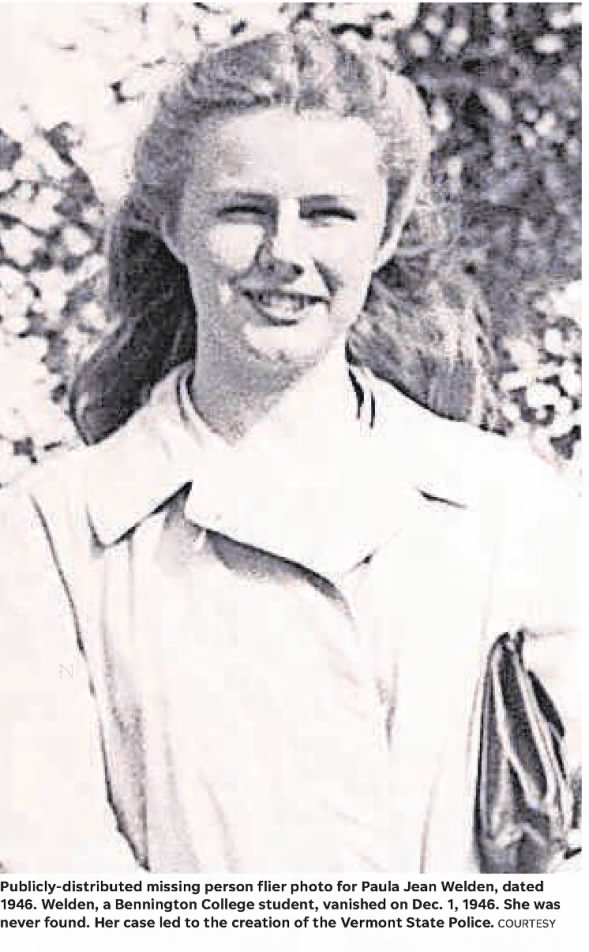
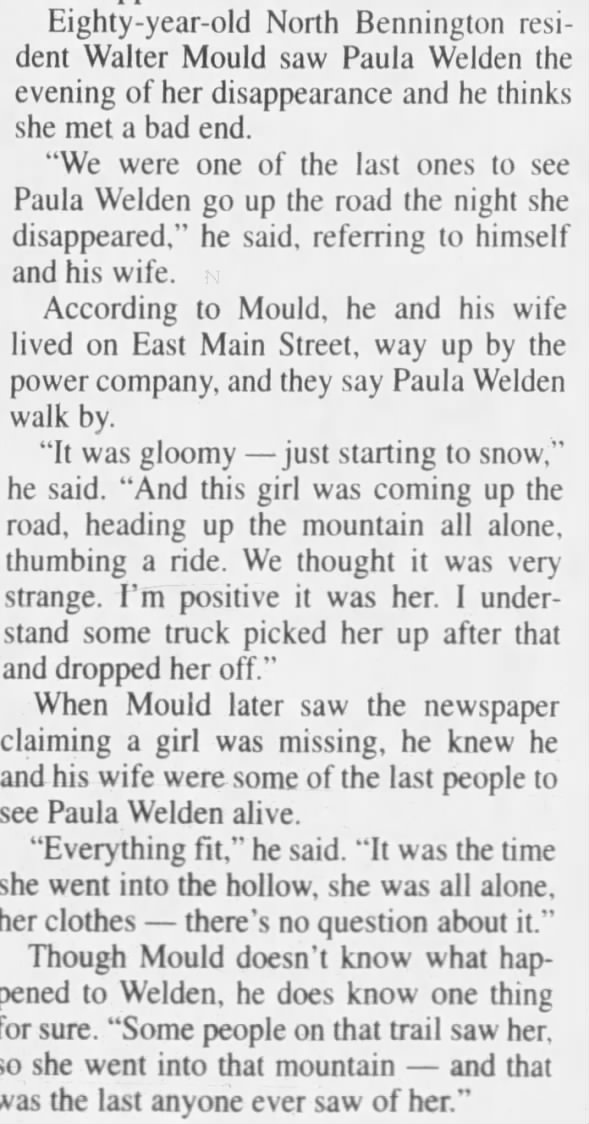


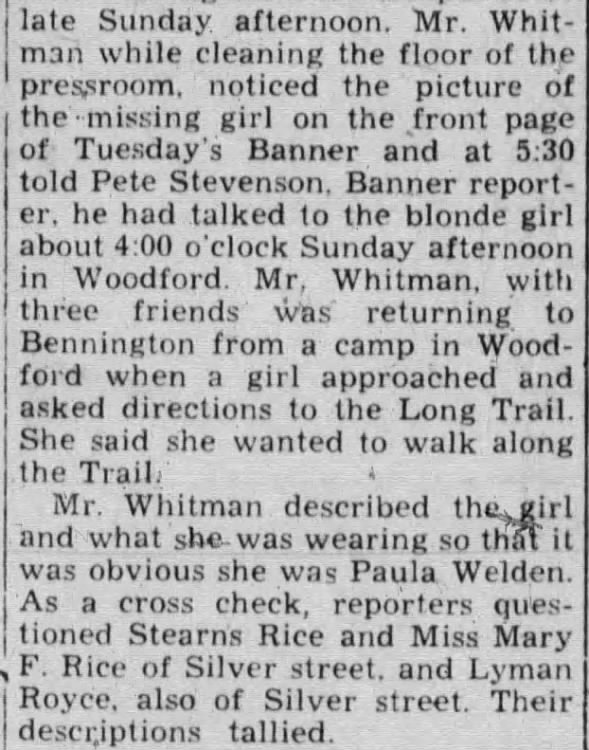
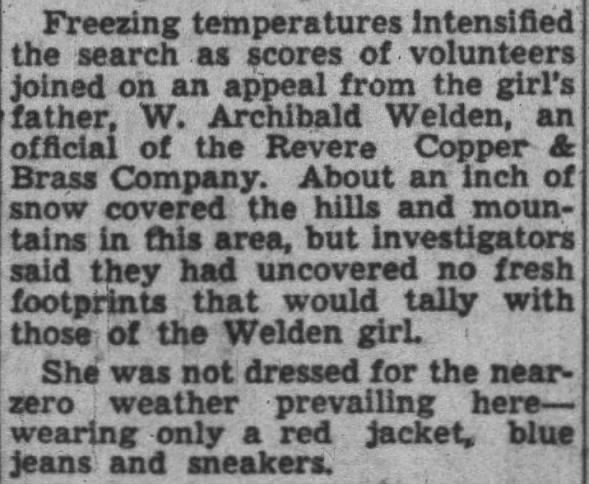
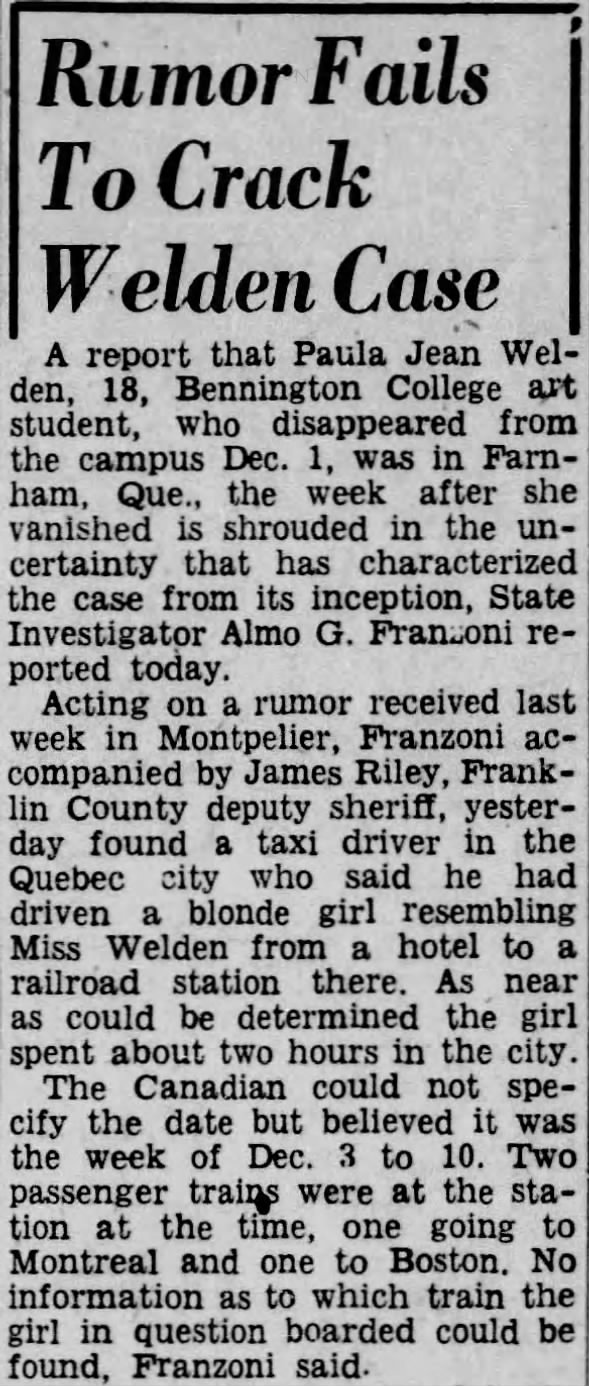

.jpg)
.jpg)

.jpg)




No comments:
Post a Comment